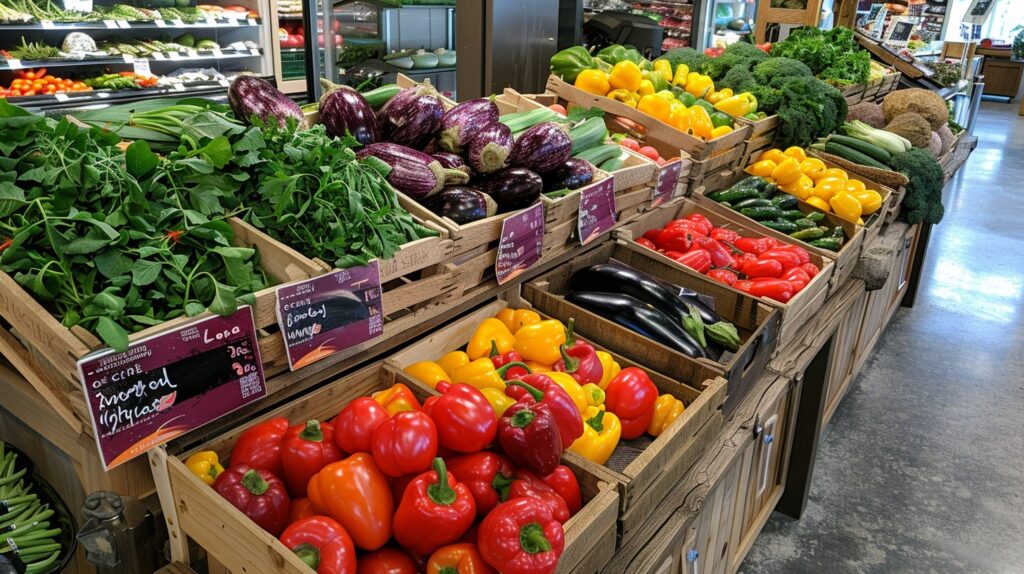Introduction
Organic foods have become a significant trend worldwide. From local farmers’ markets to supermarket aisles, the demand for organic produce has surged. But are organic foods truly worth the hype, or just a clever marketing strategy? This comprehensive guide will explore the organic food benefits, debunk prevalent organic food myths, and help you understand the organic vs. non-organic food debate. By grasping both the advantages and disadvantages, you’ll be better equipped to make informed choices for your health and well-being.
What Makes Food Organic?
Before exploring the advantages, it’s essential to understand what qualifies as “organic.” Organic foods are cultivated without synthetic pesticides, herbicides, GMOs, or artificial fertilizers. These eco-friendly practices promote soil health and biodiversity while enhancing animal welfare. Many believe that the organic food advantages outweigh those of conventionally grown produce. Organic farming methods encourage resource cycling and ecological balance. According to the USDA, these practices also help conserve biodiversity. Understanding the benefits and drawbacks of organic food can help you make informed choices. Don’t fall for common organic food myths—embracing organic can lead to a healthier lifestyle!
Organic Food Benefits: Why It Matters
1. Fewer Chemicals
One primary benefit of organic foods is the substantial reduction in exposure to pesticides and chemicals. Conventional farming often uses pesticides that leave harmful residues on fruits and vegetables, such as apples, strawberries, and spinach, which are known to have higher pesticide levels. In contrast, organic versions of these foods have little to no pesticide residue, making them a safer choice for reducing chemical intake.
2. Nutrient Density
While the scientific consensus is still evolving, numerous studies suggest that organic foods, such as organic berries, tomatoes, and leafy greens, have a higher concentration of essential nutrients like vitamins, minerals, and antioxidants. These nutrients are crucial for fighting inflammation and promoting overall health, making organic options a potentially more nutrient-rich choice. For example, research published in the British Journal of Nutrition indicates that organic crops have higher levels of antioxidants compared to their non-organic counterparts.
3. Environmental Benefits
Choosing organic is not just about personal health; it’s also about the planet. Organic farming practices help conserve water, reduce soil erosion, and foster healthier ecosystems. Among the organic food advantages, long-term environmental sustainability is crucial in our fight against climate change. The Food and Agriculture Organization emphasizes that sustainable farming practices are pivotal in conserving biodiversity and mitigating climate change impacts.
4. Reduced Antibiotic and Hormone Exposure
Organic animal products come from livestock that are not treated with antibiotics or growth hormones. This reduces the risk of antibiotic resistance and hormone residues in meat and dairy products. By choosing organic animal products, you’re avoiding these substances, which can be beneficial for your health and support more humane animal farming practices.
5. Better Soil Health
Organic farming practices enhance soil health by using natural methods like composting and crop rotation. These techniques improve soil structure, increase its ability to retain water, and boost its nutrient content. Healthy soil supports robust plant growth and reduces the need for synthetic soil amendments. This not only benefits plant health but also contributes to the sustainability of agricultural practices.
6. Ethical Farming Practices
Organic farms often adhere to higher ethical standards concerning animal welfare. Animals are provided with better living conditions, including access to outdoor spaces and natural diets. This humane treatment aligns with the values of consumers who are concerned about the welfare of farm animals and supports ethical farming practices.
7. Support for Local Economies
Purchasing organic products often means supporting local farmers and businesses. Organic farms are frequently smaller and community-based, and buying from them helps sustain local agriculture and contributes to the local economy. This support fosters community growth and helps keep small-scale farms in business.
8. Lower Risk of GMOs
Organic foods are free from genetically modified organisms (GMOs). Some consumers prefer to avoid GMOs due to concerns about potential health risks and environmental impacts. Organic certification ensures that foods are not genetically engineered, providing reassurance for those who wish to avoid GMOs.
9. Enhanced Taste
Many people find that organic foods taste better than conventional options. This improved flavor is often attributed to the natural growing conditions and focus on soil health in organic farming. For example, organic tomatoes and berries can have a richer, more robust taste, which enhances the enjoyment of meals.
10. Improved Food Safety
Organic farming methods reduce the risk of food contamination from harmful chemicals. With no synthetic pesticides or fertilizers used, organic produce is less likely to carry residues that could pose health risks. Organic farming also adheres to strict standards for soil and water quality, further ensuring food safety.
11. Biodiversity Conservation
Organic farming supports a diverse range of plant and animal species by creating varied habitats and reducing chemical use. This biodiversity helps maintain ecological balance, supports natural pest control, and contributes to the overall health of the environment. By choosing organic, you’re supporting practices that conserve and protect ecosystems.
Organic vs. Non-Organic Food: Which is Better?
Pesticide Exposure
Organic food benefits include reduced exposure to synthetic pesticides found in non-organic foods. While regulatory bodies like the Environmental Protection Agency (EPA) monitor pesticide levels in conventional produce, concerns about the long-term effects of these chemicals continue to rise. Choosing organic foods provides peace of mind with less chemical exposure.
Nutritional Comparison
The nutrient difference between organic and non-organic food isn’t always significant, but some organic foods benefits include higher levels of vitamins and minerals. However, the cost of organic foods can be higher, making them less accessible for some consumers. A review in the Annals of Internal Medicine highlights limited evidence that organic foods are significantly more nutritious than their non-organic counterparts.
Cost
One major drawback of organic food is the price. When comparing organic vs. non-organic food, organic products typically come with a higher price tag due to stricter farming regulations. However, for those who prioritize the organic food health benefits, this investment might be worthwhile.
By weighing the advantages and disadvantages of organic food, consumers can make informed decisions. Why buy organic food? The benefits for both health and the environment are compelling, and debunking myths of organic food can further clarify the importance of making organic choices.
Organic Food Pros and Cons
Pros
- Better for Your Health: One of the standout organic food benefits is the reduced exposure to chemicals. Many believe that organic foods have higher nutritional value, and studies support that eating organic can lower your risk of harmful substances.
- Supports the Environment: Organic farming plays a crucial role in protecting our planet. By promoting biodiversity and reducing pollution through natural methods, organic practices help maintain healthy ecosystems.
- Ethical Farming Practices: Choosing organic food often reflects ethical values, as organic farms typically prioritize the humane treatment of animals. These farms provide better living conditions, including outdoor access, which promotes healthier and happier animals.
Cons
- Higher Price: A major consideration in the advantages and disadvantages of organic food discussion is the price. Organic products can be significantly more expensive than non-organic options due to the stringent standards for organic certification.
- Limited Availability: Another challenge is the limited availability of organic foods in certain areas. Smaller grocery stores may not stock a wide range of organic products, which can be frustrating for those focused on the organic food health benefits.
Why Buy Organic Food? Is It Worth It?
With so many options at the grocery store, you might wonder about the benefits of organic food. The decision ultimately depends on your priorities. If you value long-term health, environmental sustainability, and ethical farming, organic food benefits make it a fantastic choice. On the other hand, if cost-effectiveness is your main concern, you might lean toward non-organic foods, which provide similar nutrition at a lower price. According to Consumer Reports, the premium price of organic foods is often justified by their numerous advantages, including reduced pesticide exposure and environmental conservation.
For many, choosing organic food provides peace of mind—knowing they are minimizing harmful chemicals while supporting farming practices that align with their values. By understanding the myths surrounding organic food and weighing its pros and cons, you can make an informed decision that best suits your lifestyle!
Debunking Organic Food Myths
Myth 1: Organic Foods Are Always Healthier
When discussing organic food benefits, it’s crucial to recognize that organic foods aren’t always superior. Some non-organic foods can match the nutritional value of organic options. A study from Stanford University revealed no consistent differences in vitamin content when comparing organic vs. non-organic food.

Myth 2: Organic Food is a Waste of Money
While it’s true that organic foods typically come with a higher price tag, the investment is justified for those prioritizing health and eco-friendly farming practices. The organic food advantages are evident, especially for items on the Environmental Working Group’s “Dirty Dozen” list, where organic foods are worth the extra cost due to higher pesticide levels in non-organic versions.
Myth 3: Organic Means Pesticide-Free
Although organic farming aims to limit pesticide use, it doesn’t eliminate it completely. Organic farms use natural pesticides, which are generally less harmful than synthetic ones. The National Organic Program highlights that organic farming standards require careful management of soil fertility and pest control, thus reducing reliance on synthetic inputs. Understanding the benefits and drawbacks of organic food helps consumers make informed decisions on why to buy organic food and the associated health benefits.
Conclusion
When considering organic vs. non-organic food, personal preferences and budget are key factors. The organic food benefits strongly support reducing chemical exposure and promoting environmentally sustainable practices. However, going completely organic isn’t necessary to enjoy the organic food health benefits. You can incorporate organic produce into your diet alongside conventional foods to experience many organic foods benefits without overspending.
Whether you choose to fully embrace organic foods or opt for a balanced approach, the key is making informed choices that align with your health, values, and budget. Remember, understanding the organic food pros and cons, and being aware of common organic food myths, will help you make the best decision for your lifestyle.
To know about Foods That Boost Immunity















